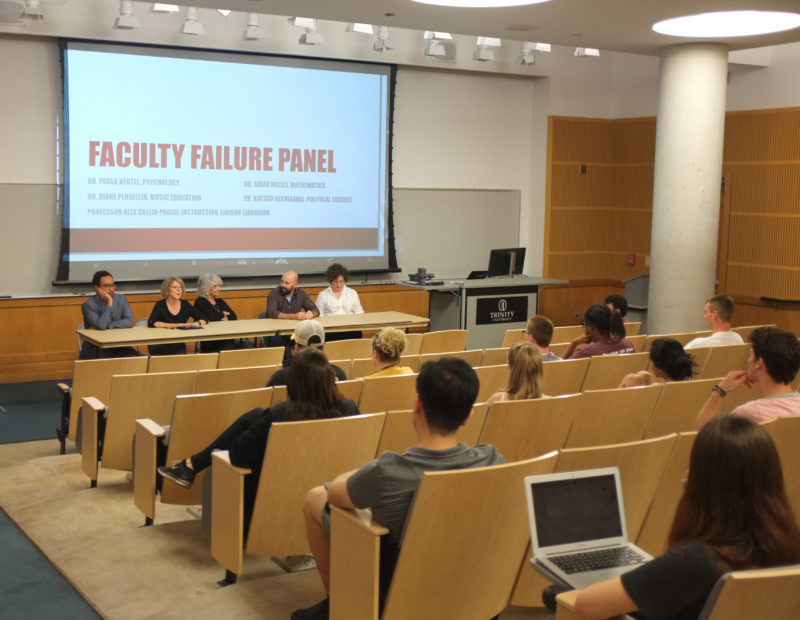A panel of five members of Trinity’s faculty from various departments shared their stories of failure in their lives to a group of approximately 30 students. The panel was organized by the Student Success Center with the hopes of helping students learn how to deal with failure.
The panel consisted of Paula Hertel, professor of psychology, Katsuo Nishikawa, professor of political science, Brian Miceli, associate professor of mathematics, Diane Persellin, professor of music, and Alex Gallin-Parisi, liaison librarian, and was facilitated by Stacey Davidson, director of the Student Success Center.
Programming concerning how to fail well began last year at Smith College. Over the summer, Hertel spoke with Davidson about bringing similar programming to Trinity. They gathered a group of faculty who agreed that Trinity students would benefit by starting a conversation similar to the one at Smith College.
Smith College started the conversation because they were noticing that there were students who are high-performing, high-achieving, all-As, AP credit, who got to their college and fail something” and maybe their version of failure is a B, Davidson said. But, students don’t always have the resources to figure out how to get past that C on a paper, so Smith has been doing all this programming around failing well, like giving certificates of failure, so that students can have permission to fail, but then learn from those mistakes and how to pick themselves up and keep going.
Hertel explained her motivation in opening the conversation on failure at Trinity.
We think that students are very much afraid of failing and don’t realize that many successful people have significant minor to major failures in their lives, so we want to encourage students to take chances when they work here, because if you’re always playing it safe, then you’re not giving yourself the opportunity to do interesting and important things, Hertel said.
Hertel also explained some of the psychology behind why high-performing high schoolers might stall in college.
If you constantly reward people, and then suddenly you stop doing that” like if a student got As and then a B what happens is that the people who have been rewarded consistently will just stop, whereas the ones who have only been occasionally rewarded will persist in the face of no or little reward, and become what we call in psychology “resilient,” Hertel said.
Through their stories of failure in both academia and personal relationships, the faculty encouraged students to be open with their failures by talking to their professors when they are struggling. They also urged students to use their failures as a learning opportunity.
“After you fail, you should still go for it. And you shouldn’t let anyone stand in your way. And I think my failure has made me more understanding of students, especially first years, because I basically failed out of grad school the first time, but now I have a Ph.D.,” said Brian Miceli, associate professor of mathematics.
Michelle Narciso, first-year communication major, was present at the panel.
“I thought it was inspirational that they all went through twists and turns in their road to success, and became things that they didn’t expect to become, and that they all agreed that their failures made them better,” Narciso said.
Davidson also spoke about the way students define failure.
Is a B a fail, or is it an opportunity to learn how you can get better? Do you take failures as a personal affront to your character, or are you seeing it as an opportunity to grow? Davidson asked. Sometimes we look at faculty and think that they’re experts in their field with the highest level of education, and clearly it was just an easy walk, so to see that people can be extraordinarily successful in the face of failure, and to hear these stories, so you can say, you know what, maybe failure isn’t so bad.







